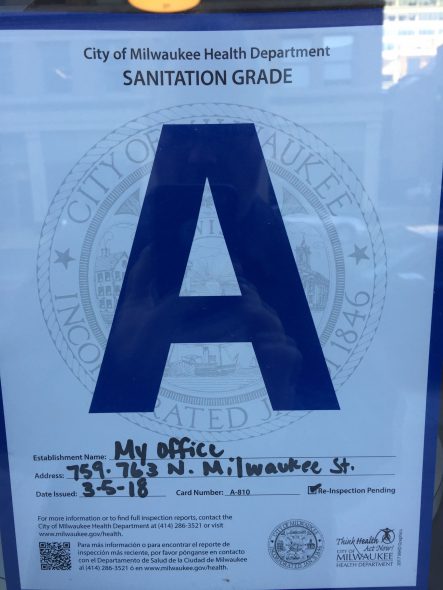City’s Restaurant Grading System Threatened
State board votes to prohibit system grading restaurants for food safety.
Less than one year after the city of Milwaukee implemented a restaurant grading system, the program will likely be eliminated.
On Thursday, the state Board of Agriculture, Trade and Consumer Protection voted 4-2 to update a series of food rules to bring Wisconsin’s food code in line with federal guidelines.
Included in the new rules is language prohibiting restaurant grading systems.
The board’s recommendation will now go to the governor and state Legislature for approval. A spokeswoman for the board said the soonest the new rules would go into effect is next spring.
Milwaukee Ald. Michael Murphy testified Thursday in support of the grading system. Murphy worked with city health department officials for four years before the program was implemented in January.
“At a minimum, (the grading system) should be given some time to move forward for a year or two and not be killed just because one special interest is more interested in money than public health,” Murphy said.
Murphy said the state’s vote Thursday was a reaction to the Wisconsin Restaurant Association’s lobbying efforts.
This year, Milwaukee’s grading system is voluntary. About 40 percent of the city’s 3,000 restaurants are participating, Murphy said. The grading system was expected to become mandatory Jan. 1.
Kristine Hillmer, president and chief executive officer of the Wisconsin Restaurant Association, said the grading gives people a false sense of security because it is too simplistic.
“It’s really not a true indicative of what the food safety culture is,” Hillmer said. “We feel the more information a consumer can get the better because we want them to make informed choices.”
The WRA has spoken with restaurants in Milwaukee and says the overwhelming response is that they do not support letter grades for food safety inspections.
Grades and scores are not an accurate predictor of the likelihood of foodborne illness outbreak in a restaurant, Hillmer said.
Sarah Sorscher, the deputy director of regulatory affairs with the Center for Science in the Public Interest, a Washington, D.C.-based consumer advocate group, said with a pass/fail system, consumers don’t have any more information than they would have if the restaurant were open or closed.
“Transparency can be a powerful motivator for restaurants to strive for better performance,” Sorscher said.
Milwaukee is the only city in Wisconsin that awards grades, although several other cities across the country including New York, San Francisco, Portland, Oregon and Minneapolis have the program.
The food grading system has been effective in Milwaukee, Murphy said.
“This is the first time in many years we have seen a reduction in critical food violations,” Murphy said. “Consumers like to know when they go into a restaurant what the safety standards are, and it helps drive the operators to do a better job, because they all would like to have an A.”
Listen to the WPR report here.
Milwaukee’s Restaurant Grading System Likely To Be Eliminated was originally published by Wisconsin Public Radio.
Political Contributions Tracker
Displaying political contributions between people mentioned in this story. Learn more.
























According to the website of the Wisconsin Restaurant Association (“WRA”), the proposed changes are designed to bring Wisconsin into compliance with the FDA’s 2013 “Food Code”.
But that code says nothing about restaurant letter grades, so bringing Wisconsin Administrative Code into compliance with the 2013 federal standards does not require dropping restaurant letter grades.
But it’s also interesting that the 2013 federal standards are themselves not up-to-date, since the feds have since issued newer “Food Code” regulations in 2017.
Restaurant grades are needed because diners cannot visit a restaurant’s kitchen or food storage areas to determine whether a restaurant protects consumers’ health. If the current letter grade system has flaws (that might, for example, award an “A” grade to a deficient restaurant), the WRA should suggest specific changes to correct those flaws.
If the current lettered grading system is too “simplistic”, then the WRA-supported “pass/fail” alternative would be even more simplistic.
Instead the WRA website suggests that prospective diners should instead examine the actual inspection report. But how could they do that? By filing a Freedom of Information request to the appropriate inspection agency months in advance of a meal?
(Asking restaurant management for the latest report doesn’t work because there is no guarantee that the report shown is the most recent. For example, if a restaurant had a clean inspection in January, but did much worse in another inspection 6 months later, what would prevent a restaurant from showing the clean, but out-of-date, inspection report?)